Dele Alli’s Return to Professional Football with Como
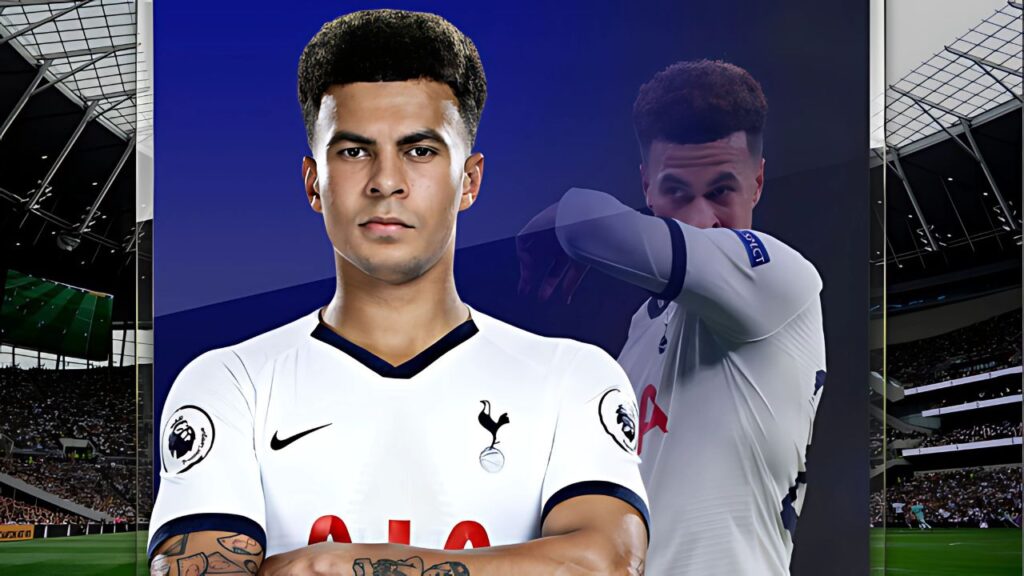
Dele Alli, the former Tottenham Hotspur and England midfielder, has signed an 18-month contract with Serie A club Como, marking a major step in his return to professional football after a lengthy period of inactivity. The deal, finalized in January 2025, represents a fresh start for Alli, who has struggled with various challenges in recent years, especially injuries that have disrupted his career progression. Background: A Career Hampered by Injuries Dele Alli’s ascent in English football was rapid and impressive. At the age of 18, he made the move from Milton Keynes Dons to Tottenham Hotspur in 2015 and soon became one of the Premier League’s most exciting young talents. Known for his attacking creativity, vision, and ability to score, Alli played a key role for Spurs under manager Mauricio Pochettino. His standout performances earned him a regular spot in the England national team, including appearances in major international tournaments like the 2018 World Cup. However, Alli’s career trajectory took a downturn due to recurring injuries, most notably a persistent hamstring problem that kept him out of action for extended periods. By the 2020-21 season, his form had dropped significantly, and he was no longer a first-choice player at Spurs. Despite flashes of his previous brilliance, Alli struggled to regain the consistency that once made him one of the brightest stars in world football. The Como Move: A New Beginning in Italy At 28 years old, Alli is now looking to revive his career in Italy’s Serie A with Como. Located in the Lombardy region, Como is a club that has made progress in recent years but is still aiming to establish itself among the top teams in Italian football. This move presents Alli with a valuable opportunity to reignite his career and prove his worth once more on the European stage. A key factor in Alli’s decision to join Como is the presence of the club’s new manager, Cesc Fabregas. The former Spanish international and World Cup winner, who has taken on a player-coach role at Como, brings a wealth of footballing intelligence and leadership to the club. Fabregas’ deep understanding of the game and his ability to control play from midfield provide a unique opportunity for Alli to rediscover his creativity and attacking instincts under the guidance of a player who was once regarded as one of the best midfielders in Europe. What This Means for Dele Alli’s Future Alli’s move to Como represents a critical juncture in his career. If he can stay fit and find his form under Fàbregas’ mentor-ship, there’s a real chance he could once again make a significant impact in European football. Series A, known for its tactical and defensive rigor, may provide the perfect environment for Alli to refine his skills and adapt to a new playing style that could suit his abilities. For Alli, Como offers a chance to regain the prominence he once enjoyed, but much will depend on his ability to stay healthy and mentally focused. His time away from the limelight might have given him the perspective and motivation needed to approach his career with renewed energy. Looking Ahead For Dele Alli, joining Como is more than just a move to a new club—it’s a chance to rediscover his love for the game and prove that he still has what it takes to perform at the highest level. While it’s uncertain whether he will return to the form that once made him one of Europe’s most promising young talents, this fresh start offers the perfect platform to rebuild his career. As Alli embarks on this new chapter, all eyes will be on him, curious to see if he can overcome the challenges that have held him back and fulfill the potential that once seemed destined to take him to even greater heights. Dele Alli has signed an 18-month contract with Serie A club Como, marking his return to professional football after injuries, aiming to reignite his career.
Erling Haaland’s Nine-Year Contract Extension with Manchester City
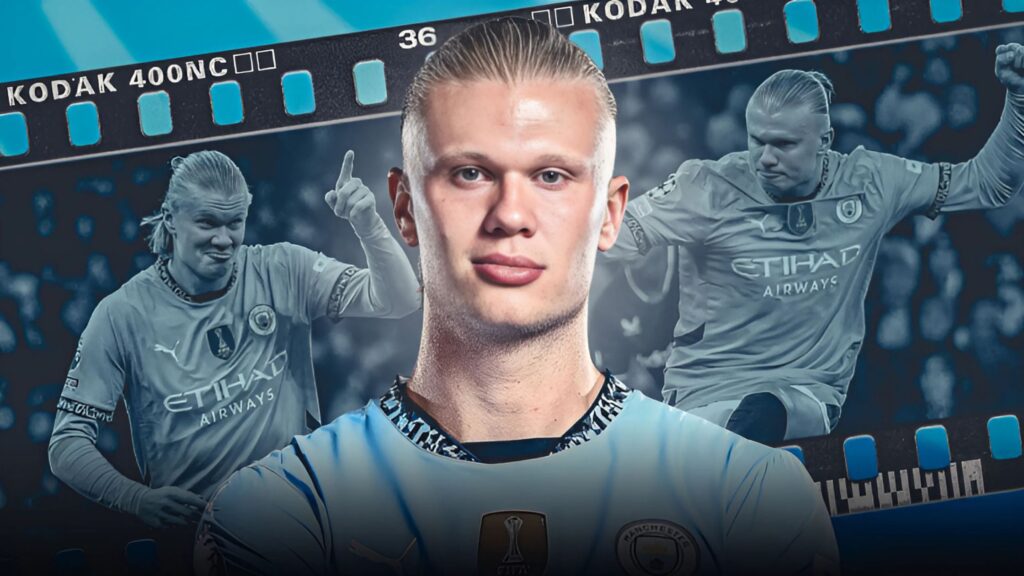
Erling Haaland has officially signed a nine-year contract extension with Manchester City, a move that has not only secured his future at the club but also significantly impacted the wider football landscape, particularly Bayern Munich’s aspirations to sign the prolific striker. This decision, which extends Haaland’s commitment to Manchester City well beyond the original terms of his contract, is a landmark moment in the modern transfer market, and it has far-reaching consequences for both clubs involved and the future of European football. The End of Bayern Munich’s Pursuit Bayern Munich had been one of the most vocal suitors of Haaland, particularly after his meteoric rise at Borussia Dortmund. With their usual forward-thinking recruitment strategy, Bayern had been positioning themselves to bring the Norwegian striker to the Allianz Arena, viewing him as a key piece to solidify their attacking lineup for the long term. Haaland, known for his remarkable goal-scoring ability, would have been a natural fit for Bayern’s ambitions in both the Bundesliga and European competitions. Bayern Munich’s Transfer Strategy Moving Forward The failure to land Haaland marks a setback for Bayern Munich in their pursuit of top-level talent to lead their attack. With this opportunity now off the table, the Bavarian club will need to rethink their forward options for the future. Bayern will likely focus on alternative strikers and attacking players, potentially looking for someone with similar goal-scoring credentials but without the immense financial cost that Haaland’s transfer would have entailed.Bayern Munich may now turn their attention toward other young talents across Europe, perhaps targeting players who are emerging as stars in leagues such as Ligue 1, La Liga, or Serie A. The club has a strong reputation for developing young talent, and they might look to invest in up-and-coming forwards who can make an impact in the long term, similar to how they successfully recruited Robert Lewandowski in 2014. Manchester City’s Long-Term Planning On the other hand, Manchester City’s decision to secure Haaland’s future for another nine years is a clear indication of their ambitions to dominate European football for the foreseeable future. The club’s ownership and management, particularly under Pep Guardiola, have been strategic in assembling a squad capable of competing at the highest level, and Haaland’s long-term presence solidifies City’s attack as one of the most potent in world football. Haaland, with his extraordinary goal-scoring record and his ability to lead the line for City, has already proven to be a key player in Guardiola’s tactical setup. This contract extension ensures that City will continue to build around the Norwegian striker, with the possibility of Haaland becoming the focal point of the team for nearly a decade. The nine-year deal also suggests that Manchester City plans to develop a system that will allow Haaland to thrive as part of their attack, focusing on creating a sustainable and long-lasting partnership between the striker and other key players like Kevin De Bruyne and Jack Grealish. The Changing Transfer Market Landscape Haaland’s extension is a significant moment in the changing dynamics of the modern football transfer market. In an era where long-term contracts are becoming increasingly rare, especially for high-profile players, the nine-year deal challenges traditional contract structures. The agreement signals that top clubs are willing to invest in players for the long haul, particularly if they view them as cornerstone players for the future.This shift may prompt other top clubs to rethink their recruitment strategies, potentially shifting focus toward securing long-term investments rather than short-term signings. For players like Haaland, this kind of contract extension could become the norm, setting a precedent for future negotiations. The Impact on European Football Haaland’s extended stay at Manchester City has broader implications for European football as a whole. For clubs in the Bundesliga, Premier League, and beyond, Haaland’s success at City further cements the growing gulf between the top-tier clubs and the rest of the European football elite. As one of the most potent goal-scorers in the world, Haaland’s presence at Manchester City makes them even more formidable contenders in the Premier League and the UEFA Champions League. Conclusion Erling Haaland’s nine-year contract extension with Manchester City has had a profound impact on both Bayern Munich and the broader footballing landscape. Bayern Munich now faces the challenge of re-evaluating their transfer strategy, while Manchester City strengthens their long-term ambitions with Haaland at the heart of their future plans. The extension is not only a significant moment for the Norwegian striker but also a statement of intent from Manchester City, ensuring that they remain a dominant force in European football for years to come.The ripple effects of this deal will continue to reverberate throughout the transfer market, shaping how clubs approach contract negotiations, player acquisitions, and squad development in the coming years. As Haaland’s future at Manchester City becomes more secure, the football world will be watching closely to see how his continued presence affects the club’s pursuit of domestic and European glory.
Eamon Dunphy Criticizes the Football Association of Ireland: Concerns Over Youth Development
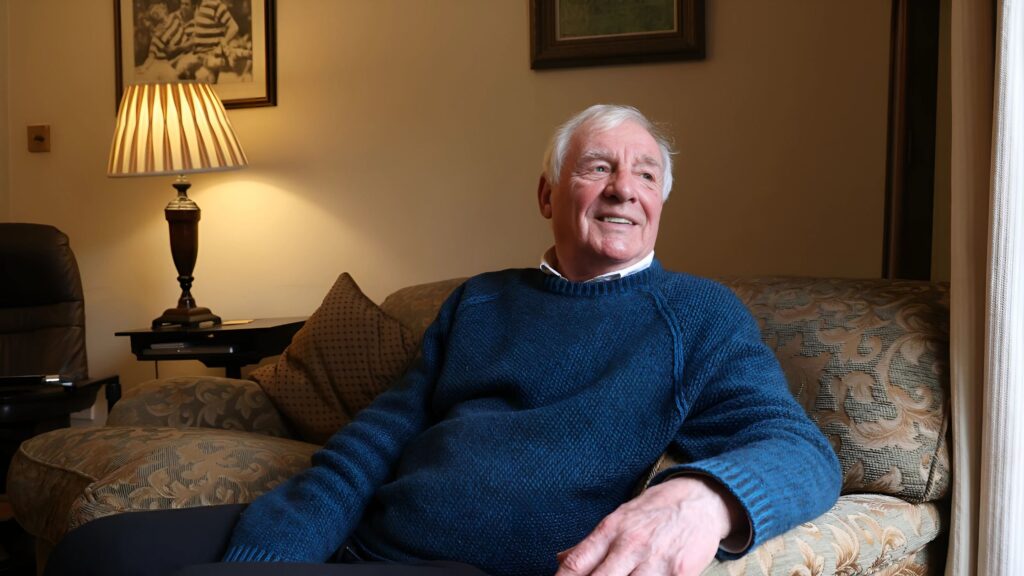
Eamon Dunphy, a prominent football pundit and former player, has recently expressed strong criticism of the Football Association of Ireland (FAI) for what he perceives as major flaws in the country’s football development system. Central to his critique is the FAI’s decision not to appoint Liam Brady, one of Ireland’s most esteemed football figures, as head of youth development. Dunphy argues that this decision, among other missteps, has contributed to the decline of Irish football at both the grassroots and professional levels. The Missing Presence of Liam Brady Liam Brady, a former Irish international and an influential figure in English football, is highly regarded for his technical expertise and understanding of the game. After retiring from playing, Brady assumed a leading role as the head of Arsenal’s youth academy, where he played a key part in developing some of the club’s brightest talents. Given his experience and successful track record in nurturing young players, Brady’s absence from Irish football has been seen as a missed opportunity, with Dunphy viewing it as a critical error. Dunphy believes that Brady, with his wealth of knowledge and standing in the footballing world, could have played a pivotal role in the development of Irish youth football. The Decline of Irish Football Dunphy attributes the FAI’s failure to appoint Brady to the broader decline of Irish football, particularly in terms of youth development. Over the years, Ireland has struggled to produce world-class football talent, despite a strong footballing culture and passionate fan-base. The country’s inability to nurture top-quality young players, combined with inconsistent coaching standards and a lack of investment in grassroots football, has led to a stagnation in both the national team’s performance and the domestic leagues. Brexit has exacerbated the situation, as new regulations now require players from the Republic of Ireland to be trained locally until the age of 18 in order to qualify for youth contracts with English clubs. This makes it even more imperative for Ireland to establish a structured youth development system capable of preparing young players for professional football. According to Dunphy, without a unified and coherent approach to youth coaching, Ireland risks losing its emerging talent to countries with more established and effective academy systems. The Importance of Proper Structures and Coaching Dunphy argues that reversing the decline of Irish football hinges on putting in place the right structures and a comprehensive coaching framework. He points to successful football academies, particularly those in top English clubs like Arsenal, as models for Ireland to emulate. During his time at Arsenal, Brady was instrumental in developing young players who went on to achieve great success both at the club and in international football. For Dunphy, the key is to focus on long-term player development rather than immediate results. Ireland needs a system that can consistently produce talented players ready to compete at the highest levels. Hope for the Future: Government Support for Football Academies Despite the challenges facing Irish football, Dunphy sees potential for change in the form of the Irish Government’s recent commitment to exploring support for football academies. The government’s new programme includes potential funding and strategic plans for the development of sports, including football. This support could provide the financial backing necessary to establish a nationwide academy system. If implemented, this initiative could be a catalyst for positive change, providing essential resources for local clubs and national academies. With the right funding, facilities, and coaching staff, Ireland could begin building an infrastructure that mirrors the success of established European footballing nations. A Vision for the Future of Irish Football The introduction of a structured academy system, supported by government funding, could provide a foundation for a more promising future for Irish football. By investing in youth development, implementing structured coaching programmers, and offering financial incentives, Ireland could begin to develop players who are well-prepared for international competition. Dunphy’s criticism of the FAI should be seen not just as a complaint, but as a call for action. He believes Irish football has the potential to regain its competitive edge in Europe, but this requires a fundamental overhaul of how the sport is developed at the youth level. By tapping into the untapped potential of young Irish players and providing them with the necessary resources and opportunities, Ireland could start to reverse its footballing stagnation. Conclusion: A Path Forward for Irish Football While the FAI has faced justified criticism for not appointing key figures like Liam Brady and failing to implement an effective youth development strategy, there is hope for the future. The government’s focus on supporting football academies could mark the first step in revitalizing the sport in Ireland. If executed well, this initiative could address the systemic issues identified by Dunphy, paving the way for a new era of Irish football talent.
Wrexham’s European Ambitions Encounter Roadblock
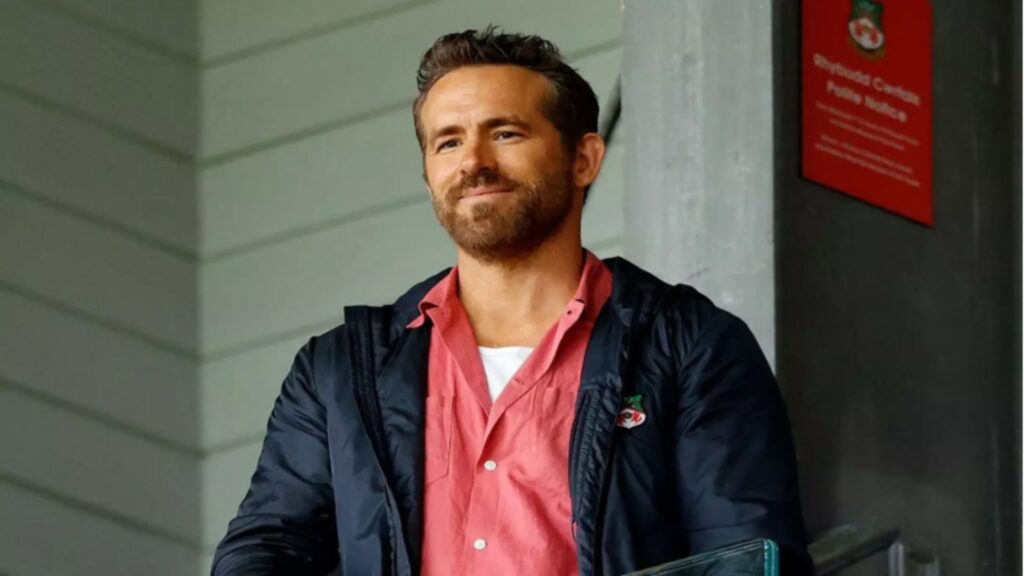
Wrexham, one of the most high-profile clubs in recent years, has encountered a significant challenge in its quest to reach European football. The club, owned by Hollywood stars Ryan Reynolds and Rob McElhenney, has set its sights on a newly proposed Welsh League Cup, which would offer the winner a coveted spot in the Europa Conference League along with a £3 million prize. The Proposal: A Rejuvenated Welsh League Cup The revamped Welsh League Cup, supported by both the Welsh Football Association (FAW) and UEFA, aims to revitalize Welsh football by creating a more competitive structure. This new competition would not only involve Welsh domestic clubs but also those from the English Football League (EFL), including Wrexham, Cardiff City, Swansea City, and Newport County. The intention behind the tournament is to boost the profile of Welsh football while providing teams with a direct route to European competition. a spot in the Europa Conference League and a £3 million prize, offering invaluable exposure on the European stage and the chance to secure global sponsorship deals, attract top talent, and grow their fan-base. Given Wrexham’s impressive progress since the club’s acquisition by Reynolds and McElhenney in 2021, this competition presents an exciting opportunity to continue building on their expanding reputation. Wrexham’s Desire: A Shortcut to Glory Reynolds and McElhenney have shown a clear interest in propelling the club to greater heights, both in the UK and internationally. Their investments have already led to vast improvements in the team’s infrastructure, including a revamped stadium and a dynamic marketing strategy. By participating in the Welsh League Cup, Wrexham could reach European competition far quicker than by following the usual progression through the English leagues, which remains a challenging task for a club currently competing in League Two. The FA’s Concerns: Integrity and Fixture Overload The proposal, however, has faced considerable opposition from the Football Association (FA) and other major football bodies such as the EFL and the Premier League. A key concern is how this new competition might disrupt the integrity of existing EFL tournaments. The introduction of an additional competition could lead to fixture congestion, which many believe could negatively affect the quality of football and the well-being of players.The FA has raised red flags regarding the scheduling of extra fixtures, which could disrupt the regular flow of domestic football. There are fears that smaller clubs may struggle to balance participation in multiple tournaments, leading to player burnout and diminished performance. Moreover, both the EFL and Premier League have expressed concerns that this new cup could overshadow traditional tournaments like the EFL Cup and the FA Cup. The FA’s Likely Stance: Rejection and Possible Consequences Sources suggest that the FA is likely to reject the idea of including Welsh clubs in the revamped Welsh League Cup. The opposition from the FA, EFL, and Premier League indicates that the proposal faces significant hurdles. There is speculation that, should Welsh clubs like Wrexham participate, they could face expulsion from the EFL, a drastic consequence for teams that are deeply integrated into English football.If the FA proceeds with this stance, Wrexham’s European aspirations would be dealt a major blow, especially if the club’s owners are determined to pursue this route. However, the Welsh FA and UEFA remain in support of the proposal, which could lead to further negotiations and possible adjustments. There’s also the possibility that the Welsh League Cup may be delayed or altered to address the concerns raised by English football’s governing bodies. What Lies Ahead for Wrexham? Although the future of the Welsh League Cup remains uncertain, Wrexham’s ambition to reach European football is far from over. The club continues to progress in the English football pyramid, with Reynolds and McElhenney’s investment continuing to strengthen both the team and its infrastructure. Wrexham’s long-term goal is to secure promotion to higher divisions, which could eventually allow them to qualify for European tournaments through traditional methods.If the Welsh League Cup proposal is ultimately rejected, Wrexham may need to explore other avenues for international competition. Nonetheless, under the current ownership, the club’s growth trajectory suggests they will continue pursuing European glory, regardless of the challenges they face. conclusion while Wrexham’s European ambitions in 2025 may be hindered by the opposition from English football’s governing bodies, the club’s impressive rise, driven by passionate ownership and a growing international fan-base, ensures that it will remain a club to watch in the coming years. The ongoing discussions and negotiations around the Welsh League Cup will likely shape the future of the club’s European aspirations, but Wrexham’s journey is far from over.
Philippe Clement Responds to Criticism of Rangers’ Away Form
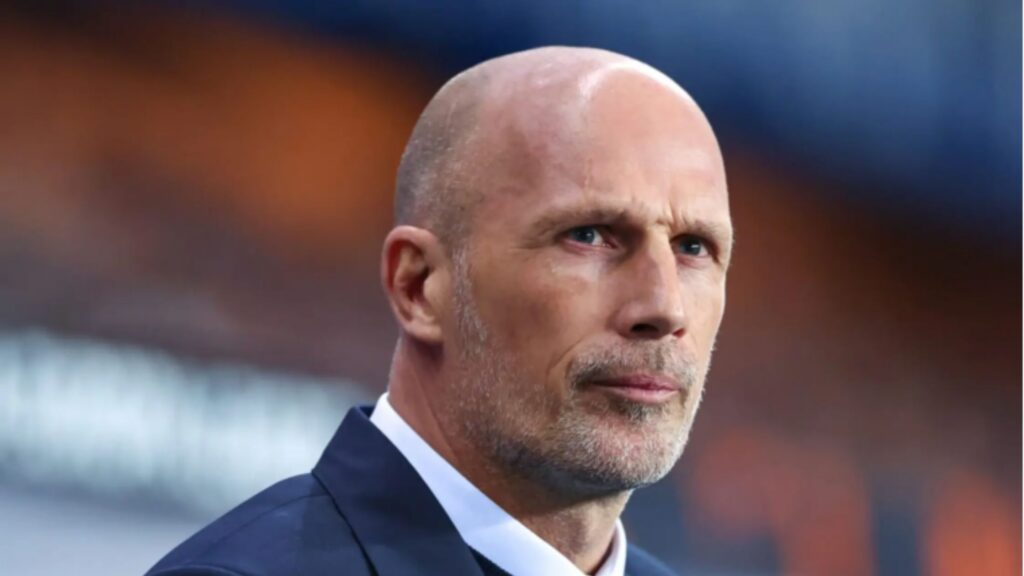
Rangers manager Philippe Clement has recently addressed the criticism directed at his team’s away performances, particularly following comments from chairman Fraser Thornton, who described their away form as “horrendous.” Clement acknowledged the merit of Thornton’s criticism, agreeing that the team’s away results have been disappointing. He has openly shared his dissatisfaction with these performances over recent months and emphasized that improvements are essential if Rangers are to return to their previous dominance. The Criticism and Its Justification Fraser Thornton’s remarks about Rangers’ away form have sparked conversation among fans and pundits alike. The team has dropped 20 points from a possible 33 in away matches, a troubling statistic for a club with ambitions of winning the Scottish Premiership title. Thornton’s characterization of the team’s away performances as “horrendous” echoes the frustrations of supporters, who have expected more from a club of Rangers’ caliber. In his response, Clement was quick to admit that the team’s away results have been disappointing. He emphasized that he has shared these concerns for some time and has been vocal about the need for change in the team’s approach to away games. Acknowledging Decline and the Need for Change Clement has been forthright in acknowledging that Rangers are currently experiencing a period of decline, with their away form playing a significant role in this downturn. The manager understands the mounting pressure on him and his players, especially as the team strives to reclaim its place at the top of Scottish football. Clement pointed out that the issues are not solely about individual performances but are also tied to the collective mentality and approach, particularly when playing away from Ibrox.The manager has stressed that improvement is needed in key areas, such as consistency, defensive stability, and tactical discipline in away matches. Despite these challenges, Clement remains optimistic that with the right adjustments, Rangers can turn their fortunes around. He emphasized that it’s not only about excelling at home but also about developing a consistent approach to away games, which has been a major hurdle this season. A Thorough Review of Football Operations In response to the team’s struggles, Rangers have initiated a comprehensive review of their football operations. This review aims to identify areas for improvement both on and off the pitch. Clement has taken an active role in this process, collaborating with the club’s leadership and coaching staff to address the issues affecting Rangers’ performances. The review is expected to examine various aspects of the club, including tactical strategies, player development, and squad depth. Injuries and the Upcoming Fixtures Injuries have also played a role in Rangers’ difficulties this season, with key players missing at crucial moments. For their upcoming Scottish Cup match against Fraserburgh, the team will be without forwards Danilo and Oscar Cortes, both of whom have been important contributors when fit. However, there is some positive news, as goalkeeper Jack Butland is expected to make a return after recovering from injury. Butland’s potential comeback could provide a much-needed boost for the team, especially in a vital cup match where Rangers will be expected to advance.The Fraserburgh match offers Rangers an opportunity to bounce back from recent setbacks. Clement has emphasized the importance of regaining momentum, particularly in cup competitions, where the club will aim to add silverware to its collection. The focus will be on securing a victory while continuing to work on improving consistency, particularly in away matches. Clement’s Optimism for the Future Despite the recent challenges, Philippe Clement remains hopeful about the future of Rangers. The manager has expressed confidence in his squad’s ability to overcome their current difficulties and regain form. While the away form has been an issue, Clement is confident that the team can correct this and achieve the results expected from a club of Rangers’ stature.Clement’s response has been one of resilience and determination. He has worked to instill confidence in his players and is focused on ensuring that the necessary changes are implemented. His belief in the team’s potential remains unwavering, and he is committed to guiding Rangers back to the top of Scottish football. Conclusion Philippe Clement’s response to Fraser Thornton’s criticism highlights a manager who is acutely aware of the challenges facing Rangers this season. The team’s struggles away from home have been a key issue, but Clement’s willingness to confront these problems head-on, while remaining optimistic, demonstrates his commitment to the club. The comprehensive review of football operations, coupled with Clement’s proactive approach, suggests that Rangers are determined to make the changes necessary to reclaim their position at the pinnacle of Scottish football. With the right adjustments and the return of key players, the club will hope to turn their fortunes around and finish the season on a positive note.
Southampton FC’s Management Restructure: A Strategic Overhaul for the Future
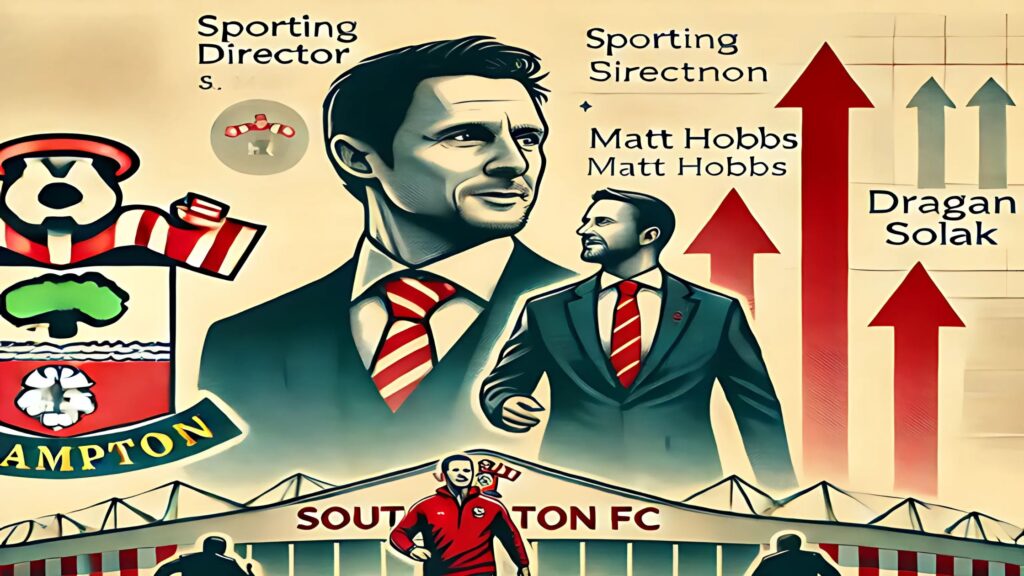
Southampton FC is currently undergoing a significant transformation, with reports suggesting the club is in negotiations with Matt Hobbs, the sporting director of Wolverhampton Wanderers, to spearhead an important reshuffling of its management. This overhaul follows a series of high-profile departures, including chairman Henrik Kraft’s resignation and the exit of director of football Jason Wilcox, who moved to Manchester United. These changes reflect the ambitions of owner Drag-an Solak to revamp the club’s structure and elevate its performance both on and off the field. Background to the Management Changes In recent years, Southampton has struggled to regain the Premier League stability it once enjoyed, marked by a series of managerial changes and inconsistent results. The club has found it difficult to establish a solid position in the league and is currently fighting against the threat of relegation. With mounting internal challenges and underwhelming performances, it became clear that a structural overhaul was necessary to rejuvenate the club’s fortunes. The resignation of chairman Henrik Kraft represented a key turning point for the club. Kraft’s departure came after a period of instability, with fluctuating leadership and a lack of clear vision for Southampton’s future. Under his leadership, the club was unable to secure a return to the upper reaches of the Premier League, prompting his resignation. The Departure of Jason Wilcox Jason Wilcox, the director of football, was another major figure to leave the club. Wilcox played a pivotal role in overseeing recruitment, player acquisitions, and youth development at Southampton. However, after his move to Manchester United in a similar role, the club found itself without a key figure to drive its footballing vision forward.Wilcox’s departure to one of the Premier League’s most high-profile clubs highlights the difficulties Southampton faces in holding onto top-tier talent in vital roles. The club’s failure to manage recruitment and transfer strategies effectively has been cited as one of the reasons for their lack of sustained success in the league. Matt Hobbs on the Horizon To address these challenges, Southampton’s owners are reportedly in discussions with Matt Hobbs, the sporting director of Wolverhampton Wanderers. Hobbs has earned a strong reputation in the Premier League for his role in Wolves’ recruitment strategy and his ability to build competitive squads despite limited financial resources. His keen eye for talent and ability to build balanced teams have made him one of the most respected figures in football management. Hobbs’ wealth of experience in the Premier League makes him an ideal candidate for Southampton as they look to rebuild their squad and improve performances. Under his leadership, Wolves have consistently performed well in the Premier League, despite having fewer financial resources than some of their competitors. The potential appointment of Hobbs is part of a broader strategic vision by Drag-an Solak to streamline and strengthen the club’s management. Solak, who took over Southampton in 2023, is committed to restoring the club to its competitive best, both on the field and in the boardroom. Dragan Solak’s Vision Drag-an Solak, the Serbian billionaire owner of Southampton, has a track record of transforming clubs through effective leadership and management. His approach has been focused on bringing in high-caliber professionals who can effectively manage both the footballing and business aspects of the club. With Southampton under increasing pressure to improve its Premier League standing, Solak’s strategy is aimed at rebuilding the club from the inside out, starting with the management team. Solak’s long-term ambition is to establish a sustainable footballing operation at Southampton that prioritizes smart player recruitment, effective youth development, and the creation of a strong team culture. Looking Ahead With the restructuring of its management team, Southampton hopes to finally overcome its recent struggles and return to Premier League success. Much of this responsibility will lie with the new sporting director and managerial staff, but Solak’s investment in the club’s future signals a commitment to long-term change and improvement. The appointment of Matt Hobbs, along with further restructuring of the club’s operational setup, could prove to be a turning point for Southampton. In the coming months, the club will need to focus on strengthening its squad, developing a cohesive tactical strategy, and ultimately re-establishing itself as a competitive force in the Premier League. With Hobbs’ experience and leadership, Southampton could find the stability and expertise needed to steer the club towards a brighter future.
Milos Kerkez’s Preferred Move: The Young Hungarian’s Path to Liverpool FC
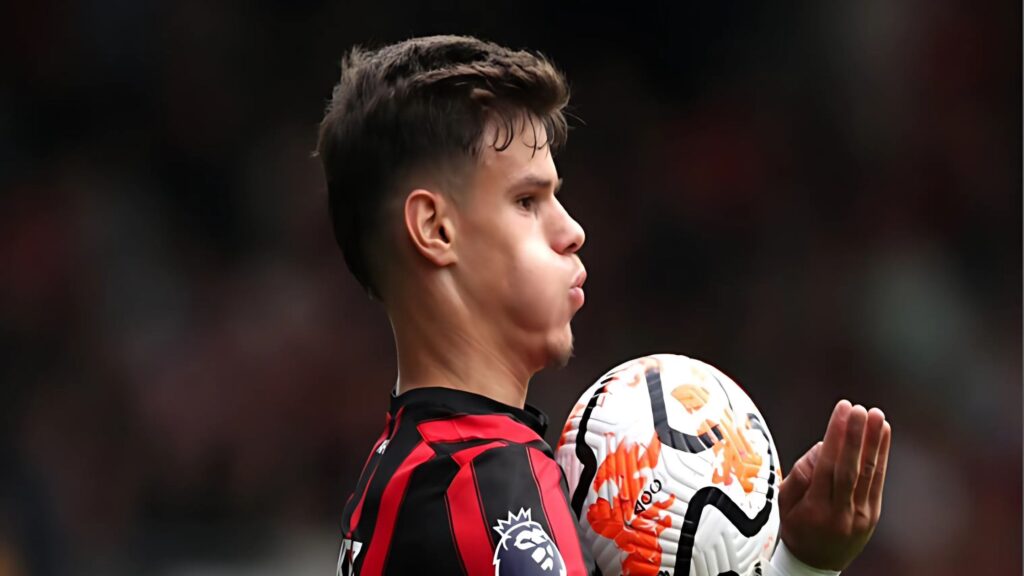
Milos Kerkez, the 21-year-old Hungarian left-back playing for AFC Bournemouth, has emerged as one of European football’s most exciting prospects. His standout performances in the Premier League have attracted interest from top clubs, with Liverpool FC reportedly his preferred destination, despite competition from Manchester City and Manchester United. Bournemouth is said to be open to selling him for a fee around £50 million, setting the stage for a major transfer in the January 2025 window. Kerkez’s Rise to Prominence Kerkez began his career in Hungary before moving to Austria and later to the Netherlands, where he refined his skills at AZ Alkmaar. His impressive displays in the Eredivisie caught the eye of Bournemouth, leading to his move to the Premier League in the summer of 2023.Since joining Bournemouth, Kerkez has quickly become a reliable left-back, showcasing both defensive stability and an attacking spark. His ability to contribute at both ends of the pitch—through strong tackles, overlapping runs, and precise crosses—has made him a key asset for his team and a potential game-changer for any club seeking to strengthen their defense. Why Liverpool FC is the Preferred Choice Compatibility with Playing Style: Under Jurgen Klopp, Liverpool has consistently favored full-backs who are strong defensively and capable of contributing offensively. Kerkez’s speed, work rate, and ability to deliver quality in the final third make him a perfect fit for Klopp’s tactical approach, where full-backs play a critical role. Path to Regular Game Time: Liverpool’s current left-back, Andrew Robertson, has been a mainstay for years but has recently struggled with injuries and occasional dips in form. Kerkez sees an opportunity to compete for a starting spot while learning from one of the best in the position. Champions League Aspirations: Liverpool’s regular participation in domestic and European competitions makes it an attractive destination for young players looking to compete on the biggest stages. Cultural and Developmental Fit: Kerkez has reportedly been impressed by Liverpool’s strong track record of developing young talent, like Trent Alexander-Arnold, who evolved into one of the world’s top full-backs under Klopp’s guidance. Interest from Manchester City and Manchester United While Liverpool remains Kerkez’s preferred choice, both Manchester City and Manchester United have expressed interest: Manchester City:City’s dominance in domestic and European competitions offers a platform to work under Pep Guardiola, a tactical mastermind. However, the fierce competition for places in City’s squad could limit Kerkez’s opportunities for regular game time. Manchester United:United, in the midst of a rebuilding phase under Erik ten Hag, may offer more immediate playing time. However, the club’s ongoing struggles with consistency could make Liverpool a more appealing option for Kerkez. Bournemouth’s Position Bournemouth is reportedly willing to let Kerkez go, provided their £50 million valuation is met. This fee reflects his potential and the increasing demand for young, dynamic full-backs in modern football. Selling Kerkez would also give Bournemouth the chance to reinvest in their squad as they aim to strengthen their position in the Premier League. What Kerkez Brings to Liverpool Defensive Strength: Kerkez has proven his ability in one-on-one defending, positional awareness, and strong tackling, making him a reliable presence in defense. Attacking Potential: His overlapping runs, accurate crosses, and occasional goals add an attacking dimension that Liverpool values in their full-backs. Youth and Potential: At just 21, Kerkez has plenty of room for growth, making him a long-term investment for any club. Potential Challenges Adapting to a Bigger Club: Moving to a top-tier club like Liverpool brings added pressure and heightened expectations for performance. Competition for Places: At Liverpool, Kerkez will compete with an established player like Robertson, potentially limiting his immediate playing time. Conclusion Milos Kerkez’s potential move to Liverpool reflects the club’s commitment to building a squad capable of competing at the highest levels for years to come. With his youth, versatility, and skill set, Kerkez has the potential to become a cornerstone of Liverpool’s defense, contributing to the club’s ambitions in both domestic and European competitions. For Kerkez, a move to Liverpool would offer an ideal platform to showcase his talent and an environment to further develop under the guidance of Jurgen Klopp. While Manchester City and Manchester United remain interested, Liverpool’s playing style, developmental focus, and competitive stature make them the perfect destination for one of Europe’s most promising left-backs.
Bayern Munich’s 5-0 Dominance Over Hoffenheim: A Complete Team Performance
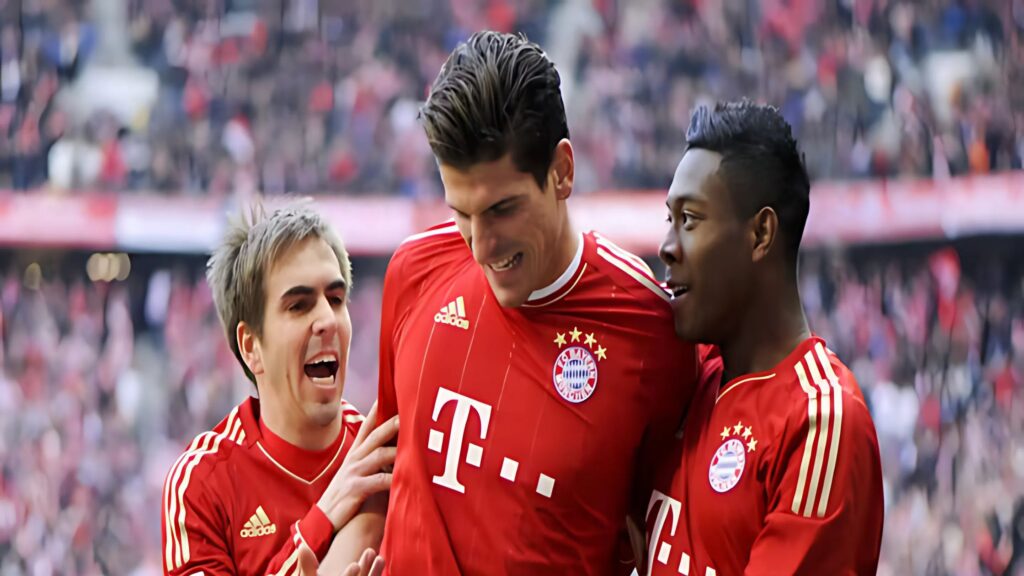
Bayern Munich delivered a commanding 5-0 victory over Hoffenheim in the Bundesliga, demonstrating their dominance right from the outset. The match at Allianz Arena saw Bayern combine fluid attacking play with solid defensive organization, with several players putting in standout performances. Leroy Sane Opens the Scoring Early The match kicked off at a fast pace, and it wasn’t long before Bayer n took the lead. In the 12th minute, Leroy Sane scored with a precise strike after a slick exchange of passes on the left wing. A well-timed cross into the box found Sane, who made no mistake in converting, putting Bayern 1-0 up. Sane’s quick decision-making and clinical finishing showcased his quality and gave Bayern an early advantage. Raphael Guerreiro Extends the Lead Bayer n doubled their lead in the 28th minute with a goal from Raphael Guerreiro. The Portuguese midfielder was in the right place at the right time when a scramble in the Hoffenheim penalty area saw the ball fall to him. Guerreiro calmly slotted it home for a 2-0 lead, adding to his growing influence in Bayern’s midfield. Harry Kane Converts from the Spot Shortly after Guerreiro’s goal, Bayern was awarded a penalty in the 34th minute. Hoffenheim’s goalkeeper, Oliver Baumann, had brought down Serge Gnabry in the box, giving Harry Kane the opportunity to increase Bayern’s lead. Kane, known for his composure, confidently converted the penalty, sending the ball past Baumann and making it 3-0. This goal was another reminder of Kane’s clinical form since joining Bayer n. Serge Gnabry Adds Another Bayern’s attacking onslaught continued in the second half, with Serge Gnabry getting on the score-sheet in the 56th minute. Receiving the ball at the edge of the box, Gnabry unleashed a powerful shot that beat Baumann and found the top corner, making it 4-0. This stunning strike highlighted Gnabry’s technique and vision, putting the game firmly in Bayern’s control. Leon Goretzka Seals the Victory In the 83rd minute, Bayer n added a fifth goal, with Leon Goretzka finishing off a swift counterattack. Mathys Tel, who had replaced Kingsley Coman earlier due to injury, delivered a precise assist to Goretzka. The German midfielder finished calmly, capping off a brilliant team move and sealing a 5-0 victory. Tactical Adjustments and Lineup Changes Bayern Munich made several tactical changes for the match. Aleksandar Pavlovic was included in the defense, while Dayot Upamecano’s return to the starting lineup further strengthened the backline. Upamecano had been sidelined due to injury but looked sharp upon his return.Kings-ley Coman, a key figure in Bayern’s attack, was substituted in the second half after picking up a slight injury. His replacement, Mathys Tel, made an immediate impact, assisting on Goretzka’s goal and proving his ability to contribute off the bench. Team Performance Bayern Munich’s team play was fluid and cohesive throughout the match. In midfield, Joshua Kimmich and Guerreiro controlled possession and created numerous opportunities. Defensively, the partnership between Upamecano and Pavlovic held firm, limiting Hoffenheim to few chances and ensuring Bayern’s solid defensive performance. The victory served as a statement, reinforcing Bayern Munich’s place at the top of the Bundesliga. Beyond the scoreline, their style of play left Hoffenheim with little room to mount a challenge. Conclusion Bayern Munich’s 5-0 win was a comprehensive display of their attacking potency, defensive solidity, and squad depth. With players like Kane, Sane, and Gnabry leading the charge, and a defense that remained unbreached, Bayern showed they are in exceptional form and poised to continue their push for the Bundesliga title.
Jamshedpur FC’s Rise in the Indian Super League: A Comprehensive Review
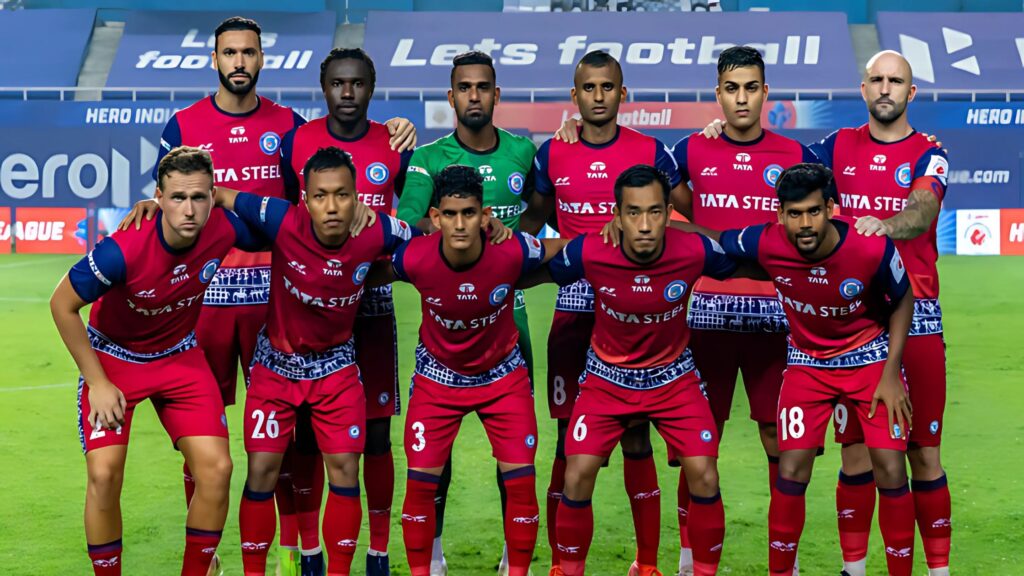
Jamshedpur FC’s resurgence in the Indian Super League (ISL) has been nothing short of inspiring. Their emphatic 3-0 victory over Mumbai City FC has propelled them to third place in the league standings, solidifying their position as strong contenders for the playoffs. This significant win highlights their growing momentum and determination to compete at the highest level. The Match: A Tactical Masterclass and Stellar Execution Jamshedpur FC’s performance against Mumbai City FC was a testament to their strategic planning and precision on the field. Here’s an analysis of their dominant display: High Press and Aggressive Start: From the first whistle, Jamshedpur implemented a high-pressing game, pressuring Mumbai City’s defense into costly errors. This strategy disrupted Mumbai’s rhythm and allowed Jamshedpur to dictate the pace early in the match. First-Half Superiority: The breakthrough came in the 18th minute, with Daniel Chima Chukwu scoring a well-placed header from a perfect cross by Ritwik Das.Mumbai’s efforts to regain control were effectively neutralized by Jamshedpur’s well-organized defense, led by the commanding Eli Sabia. Midfield Dominance: The midfield trio of Jitendra Singh, Pronay Halder, and Wellington Priori outshone their opponents, ensuring a steady flow of opportunities for the forwards.Priori’s ability to control the tempo and distribute the ball effectively was instrumental in Jamshedpur’s dominance. Clinical Second-Half Performance: Boris Singh doubled the lead in the 56th minute with a composed finish, capitalizing on a swift counter-attack. Ishan Pandita added the third goal in the 82nd minute, sealing the game with a powerful strike after a defensive lapse by Mumbai City. Key Factors Behind Jamshedpur FC’s Success Revitalized Offense: Under the guidance of head coach Scott Cooper, Jamshedpur’s attacking unit has become more fluid and effective.The trio of Chima, Ritwik Das, and Boris Singh has been in exceptional form, consistently contributing to the team’s goal-scoring efforts. Defensive Discipline: Jamshedpur has one of the most reliable defenses in the league, conceding just three goals in their last five matches.The partnership between Eli Sabia and Pratik Chaudhari has provided the stability needed to thwart opposition attacks. Youthful Energy Complemented by Experience: The team has struck a perfect balance, blending the enthusiasm of emerging talents like Jitendra Singh and Ishan Pandita with the seasoned presence of Wellington Priori and other experienced players. Effective Recruitment: The acquisition of impact foreign players and the nurturing of domestic talent have strengthened the squad’s depth and versatility. Impact of the Victory Enhanced Playoff Prospects:This win has solidified Jamshedpur FC’s position in the top four, making them a formidable contender for the postseason.Consistency in their remaining fixtures will be key to securing their playoff spot. Psychological Advantage:Defeating a strong side like Mumbai City FC in such a convincing manner sends a clear message to their competitors.This result boosts the team’s confidence and sets the tone for the challenging games ahead. Renewed Fan Engagement:The team’s resurgence has reignited passion among fans, as seen in the electrifying atmosphere at their home games. Challenges on the Horizon To sustain their upward trajectory, Jamshedpur FC must address a few critical areas: Improving Away Form: Their performances on the road need enhancement to maintain consistency. Injury Management: With a packed schedule, keeping players fit and available will be vital. Managing Expectations: Rising expectations could add pressure, requiring mental toughness and effective leadership. Conclusion Jamshedpur FC’s climb to third place in the ISL standings is a reflection of their meticulous planning, cohesive teamwork, and relentless effort. Their 3-0 victory over Mumbai City FC demonstrates their ability to deliver under pressure and underscores their ambition to excel. With a combination of tactical brilliance, individual excellence, and passionate fan support, Jamshedpur FC is well-positioned to make a significant impact in the 2025 ISL season.
The Business of Football: Is the Financial Model Sustainable
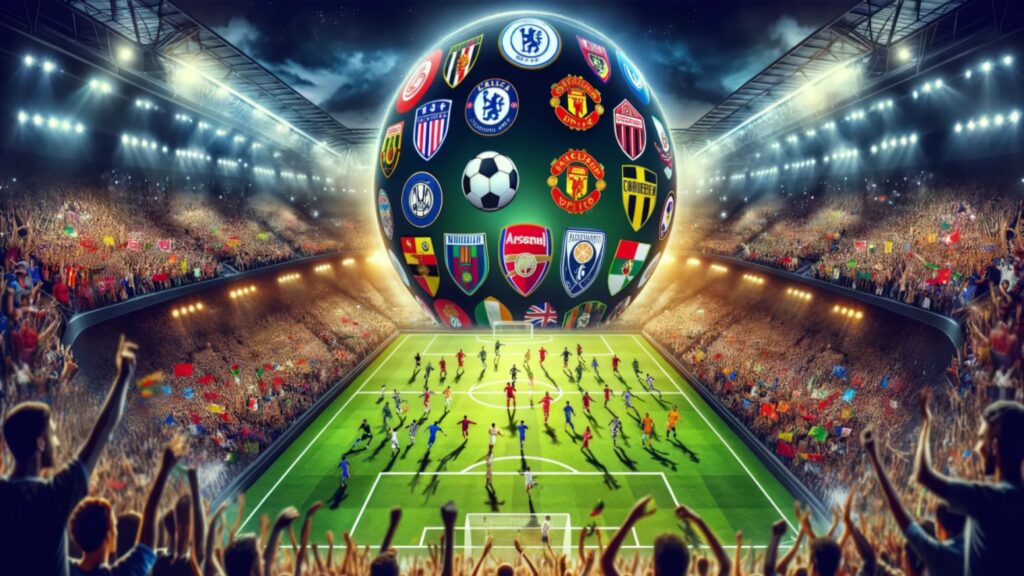
Football has long been one of the most popular and profitable sports in the world. The commercialization of football, with its lucrative sponsorship deals, massive television contracts, and extravagant player transfers, has transformed the sport into a global business worth billions. While these financial gains have propelled clubs to new heights, they have also raised questions about the sustainability of football’s economic model, especially in the post-pandemic landscape. As the financial side of football continues to grow, so do concerns about the long-term health of its business practices. The Commercialization of Football Football’s transition from a sport primarily focused on athletic achievement to a global business empire began in the 1990s. The advent of television broadcasting rights and sponsorship deals turned football into a multi-billion-dollar industry, with some of the world’s biggest clubs generating substantial revenue streams from both domestic and international markets. In the modern era, commercial interests are at the core of football’s growth. The introduction of global broadcasting deals has played a massive role in driving the financial expansion of the sport. The English Premier League (EPL), for example, has secured some of the most lucrative television rights deals in world sport, with the 2019-2022 deal estimated to be worth around £9.2 billion. The impact of such deals is reflected in the ever-increasing wages of players, higher transfer fees, and the massive profits enjoyed by top clubs. Sponsorship and Advertising Deals Sponsorship deals are a cornerstone of football’s financial ecosystem, providing clubs with millions of dollars in annual revenue. From shirt sponsor-ships to stadium naming rights and long-term commercial partnerships, brands are eager to align themselves with top football clubs due to the sport’s unparalleled global reach. The most famous examples include Manchester United’s £47 million-per-year deal with Chevrolet, and Barcelona’s €55 million-per-year deal with Rakuten, which highlight the immense value brands place on football’s visibility. Sponsorship and advertising revenues have allowed clubs to fund their operations, player acquisitions, and infrastructure upgrades. But the question remains—are these deals sustainable, or are clubs becoming too dependent on them? Sponsorship agreements are tied to a club’s commercial performance, and any drop in performance or global appeal could result in sponsorship deals being renegotiated or canceled altogether. The Rise in Player Transfers and Wage Bills One of the most visible financial aspects of football is the rising cost of player transfers and wages. In recent years, the transfer market has exploded with eye-watering figures. Neymar’s world-record €222 million transfer from Barcelona to PSG in 2017 set the stage for even bigger transfers, with players like Kylian Mbappeand Cristiano Ronaldo also commanding fees in the hundreds of millions. Even mid-tier players are now being sold for sums previously reserved for global superstars. Transfer fees are not the only significant financial burden on clubs; player wages have also seen astronomical increases. The most high-profile players earn multi-million-pound salaries, with Lionel Messi, Cristiano Ronaldo, and Kylian Mbappe being among the highest-paid footballers. These massive wage bills are further inflated by endorsement deals, which can sometimes exceed a player’s club salary. The rise in wages has had a ripple effect, with even mid-table clubs now expected to offer competitive wages to attract top-tier talent. Financial Fair Play and Regulations In response to the increasing financial disparity and rising debts, governing bodies like UEFA have introduced regulations like Financial Fair Play (FFP) to try and curb overspending by clubs. FFP was designed to prevent clubs from spending beyond their means and accumulating unsustainable debt. However, the effectiveness of these regulations has been questioned, particularly after high-profile clubs like Manchester City and Paris Saint-Germain were found to have violated the rules and were either fined or had sanctions reduced. While FFP has helped curb some of the excesses, critics argue that the regulations still fail to address the financial inequalities in football. Wealthier clubs are still able to leverage sponsorship deals and external funding to bypass FFP, while smaller clubs face more significant constraints. The growing financial gap between the richest clubs and the rest of the league continues to raise concerns about the long-term sustainability of the sport. The Post-Pandemic Landscape The COVID-19 pandemic had a significant impact on football’s finances, with match-day revenues evaporating due to empty stadiums, and broadcasting deals being renegotiated or delayed. According to a report by Deloitte, the English Premier League clubs alone lost around £1.5 billion in revenue during the 2020/2021 season, and many other leagues experienced similar declines. While football is slowly recovering, the pandemic highlighted the vulnerabilities of the sport’s financial model. Top clubs have been hit hardest by the pandemic, while smaller clubs that rely heavily on match-day income have faced existential threats. Many clubs have had to rely on loans, government assistance, and player sales to remain solvent, which further exacerbates financial instability in the short term. In the long run, the impact of the pandemic may lead to a reshaping of football’s economic structures. With uncertainty still clouding the global economy, there may be a shift away from big-money transfers and excessive wages toward more sustainable financial models. Clubs may focus more on developing homegrown talent, reducing their reliance on debt, and diversifying their revenue streams beyond television deals and sponsorships. Is Football’s Financial Model Sustainable? The question of sustainability is central to the future of football. While the sport has undoubtedly seen massive growth over the last few decades, the financial model of football seems to be on an unsustainable path. The increasing commercialization of the sport, the obsession with high-profile sponsorship deals, and the ever-rising transfer fees and wages are creating a financial arms race that could leave some clubs behind. The financial gap between the top clubs and the rest is widening, creating an environment where only the wealthiest clubs have the resources to compete for the best talent. This imbalance threatens the competitive nature of football, which has always been a cornerstone of the sport’s appeal. Ultimately, the sustainability of football’s financial model will depend on a few key factors: Financial Regulation: Stronger financial
